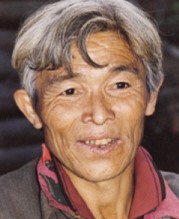Labapo in China

Photo Source:
Copyrighted © 2026
Operation China, Asia Harvest All rights reserved. Used with permission |
Send Joshua Project a map of this people group.
|
| People Name: | Labapo |
| Country: | China |
| 10/40 Window: | Yes |
| Population: | 8,300 |
| World Population: | 8,300 |
| Primary Language: | Sani |
| Primary Religion: | Ethnic Religions |
| Christian Adherents: | 0.00 % |
| Evangelicals: | 0.00 % |
| Scripture: | Portions |
| Ministry Resources: | No |
| Jesus Film: | Yes |
| Audio Recordings: | Yes |
| People Cluster: | Tibeto-Burman, other |
| Affinity Bloc: | Tibetan-Himalayan Peoples |
| Progress Level: |
|
Introduction / History
The Labapo know little of their history, except that they originated farther to the north of their present location and migrated across the mountains at least 300 years ago. The Labapo have been combined with four other tribes in Kaiyuan County into a group called Aza. The Labapo (Laba Tribe) are not the same as the Laba, a large group in Guizhou Province who have recently been classified as Miao.
What Are Their Lives Like?
The Labapo still retain some of their customs and festivals. At various times of the lunar calendar, all Labapo gather for celebrations and festivities that last two and a half days; during this period, they eat communal meals. The feasting is always accompanied by copious amounts of alcohol, singing and revelry.
What Are Their Beliefs?
The Labapo worship their ancestors. They also live in fear of the spirit world. The Labapo believe in three main types of ghosts: spirits of accidental or unclean deaths, invisible demons and slota (unusual phenomena which cause disasters). Twice a year, they sacrifice a pig and a chicken at a worship stone near the sacred village tree, which they believe houses a protective dragon.
There has never been a Christian church among the Labapo. They remain a completely unreached people.
What Are Their Needs?
They need Jesus guidance to understand the purpose of this life. They need to move away from idolatry. They need nearby Christian communities to help them grow spiritually.
Prayer Points
Pray that God intervenes in their lives and helps them understand his value and worth in our lives.
Pray their hearts be softened to Jesus, their true Lord and savior.
Pray for a church planting movement to rise up in the Labapo homeland.
Pray for loving missionaries to reach the Labapos.